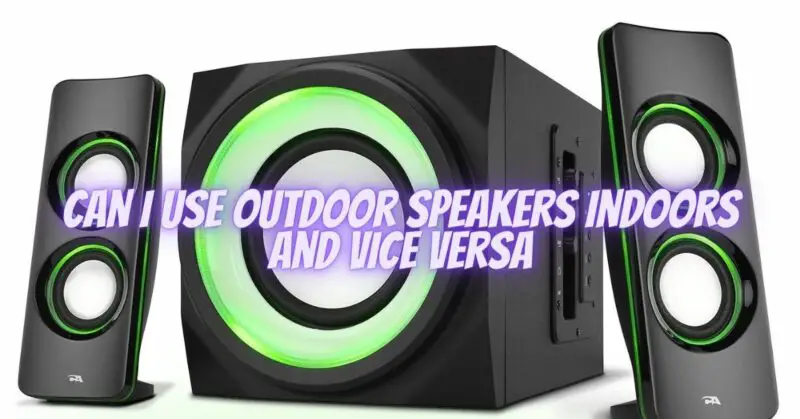Outdoor and indoor speakers are designed with specific considerations to suit their intended environments. However, it is natural to wonder if outdoor speakers can be used indoors and if indoor speakers can be used outdoors. In this article, we will explore the possibilities and considerations when using outdoor speakers indoors and indoor speakers outdoors.
Using Outdoor Speakers Indoors:
- Durability and Weather Resistance: Outdoor speakers are built to withstand the elements, including exposure to sunlight, rain, and extreme temperatures. When using outdoor speakers indoors, their durability and weather resistance are not necessary factors. However, it does not hinder their performance if the speakers meet your sound quality requirements.
- Sound Quality and Acoustic Considerations: Outdoor speakers are typically designed to project sound over a wider area to cover an outdoor space. Indoors, the sound projection may not be as optimized, and the audio may not be as focused or detailed as with indoor speakers. Additionally, outdoor speakers may lack certain acoustic features that indoor speakers have, such as precise imaging and soundstage.
- Aesthetic Considerations: Outdoor speakers may have a rugged or utilitarian design, which might not align with the aesthetic preferences for indoor use. However, some outdoor speakers come with customizable covers or finishes, allowing for better integration into indoor spaces.
Using Indoor Speakers Outdoors:
- Protection from the Elements: Indoor speakers are not designed to withstand exposure to moisture, extreme temperatures, or direct sunlight. When using indoor speakers outdoors, it is crucial to provide protection from these environmental factors. Consider placing the speakers under a covered area or using weatherproof enclosures to shield them from rain, direct sunlight, and other elements.
- Sound Quality and Power Handling: Indoor speakers are optimized for delivering accurate and detailed sound reproduction within a controlled indoor environment. When used outdoors, they may struggle to project sound effectively over a larger area and may not handle the power demands needed for outdoor listening. The audio performance may be compromised, resulting in reduced volume, clarity, and bass response.
- Longevity and Warranty: Using indoor speakers outdoors can expose them to conditions that may shorten their lifespan. Exposure to moisture, extreme temperatures, or direct sunlight can potentially damage the speakers over time. Additionally, it is important to consider the impact on the warranty, as manufacturers typically do not cover outdoor use or any damage caused by outdoor exposure.
Conclusion:
While it is technically possible to use outdoor speakers indoors and indoor speakers outdoors, there are important factors to consider. Outdoor speakers may not provide the same level of focused sound projection and precise acoustic performance as indoor speakers. Indoor speakers, on the other hand, lack the weather resistance and durability required for outdoor use. When using speakers in environments for which they were not specifically designed, it is crucial to take precautions to protect them and to be aware of potential compromises in sound quality and longevity.
To ensure the best audio experience and to protect your investment, it is generally recommended to use speakers in their designated environments. If you have specific requirements for using speakers outside their intended environments, consider consulting with audio professionals who can guide you in selecting appropriate equipment or offer alternative solutions for your specific needs.

